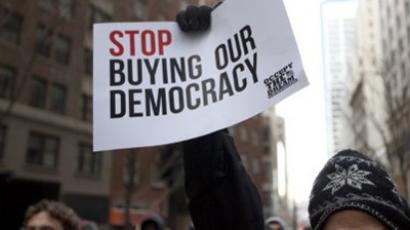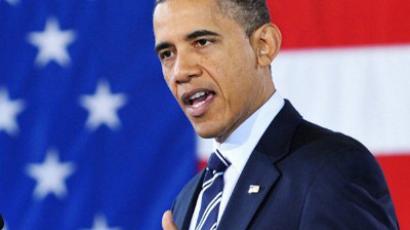Whose bank? Our bank! The Yes Men explain their prank on BofA
When a press release directed media outlets to a phony Bank of America website on Wednesday, it shouldn’t have been that hard for reporters to realize they were being fooled.
"Banking is too complicated for ordinary people to understand," reads just one excerpt from the memo. "That's not to say people are stupid."In just a page, pranksters spread the word about YourBofA.com, a fake website released under the guise of re-branding one of the country’s biggest banks. The Dow Jones Newswire was one of the gullible outlets that took the bait, only later to correct the gaffe and inform subscribers to their service that they had been duped by the scam. Nonetheless, it would seem as if the creators of the cleverly crafted mock-up got their point across.“The main issue that we want to bring to people’s attention is banks fail,” explains Andy Bichlbaum, which is, of course, yet another joke. That’ just one of the pseudonyms used by activist Jacques Servin of The Yes Men. For years his group has been trying to take down what they see as corrupt corporations using carefully orchestrated maneuvers like the YourBofA website launch. Given both the success and backlash that he has incurred already, it wouldn’t be too far off to say they he’s achieved his goal.“In 2008, a number of banks failed and the taxpayers were asked to bail them out,” he adds while speaking on RT on Thursday. “And the taxpayers did — through the government. Now those same banks are acting the same as they did before. Now, if bank of America fails, and it looks like it very well could in the next couple of years, what are we going to do with it? We’ll bail it out, but then we’ll be able to do whatever we want.”That’s what Bichlbaum wants Americans to think, at least. On his phony website, the Yes Men (who did not originally credit themselves with the prank) ask for customers to explain what they would do with their own bank. The reasoning, he says, is rather simple.“It’s pretty obvious that most people have better ideas about banking should do than the people who actually run the banks. That’s what this site is all about,” he tells RT.Bichlbaum admits that the Yes Men never intended to bring any harm, per se, to Bank of America. “Bank of America is bringing itself down. It doesn’t really need our help,” he says. “It’s pretty obvious that they’re doing their best to ruin themselves.” When they do hit rock bottom, however, Bichlbaum says Americans should be hesitant before they think about bailing them out. And also, he tells RT, the country should be ready to avoid another major recession at all costs.“What we want to do is — whether or not bank of America itself fails…whatever the next bank is that fails, we don’t want a repeat of 2008,” he tells RT. “There are many, many smart things that banks could do. And there are many, many stupid things that they do that they could stop doing.”Even if (the real) BofA is working towards ending its own reign at the top of Wall Street, Bichlbaum says Americans can go elsewhere even before the bank goes bust. “If you put your money in a checking account, shouldn’t you have a say over what that money does?” he asks. “Right now, if you put your money in a checking account, the bank invests it wherever it wants, even if it’s something that you really dislike. I’d personally like to have my say on what the money is doing.”The solution, which many members of the Occupy Wall Street movement have said since that group’s beginning, is to switch to credit unions. “There are a lot of local credit unions, small credit unions, that are answerable to local communities. If the community doesn’t like what the credit union is doing, they can actually stop them.”Bichlbaum says he worked with The Yes Men collective with assistance from members of Occupy Wall Street in launching the site, which has since been written-up by the press all across the country. Although most of those articles celebrate the site for its send up of snarky satire, in a way that seems to be enough to get people talking. At least that’s Bichlbaum’s wish. “It’s just a trick to get the site into the news and get people using it to trade ideas about how banking should be,” he tells RT. And in the end, that only helps get the group’s message across which, he says, is also rather simple: “To get people understanding that they can run banks better than the bankers can.”














